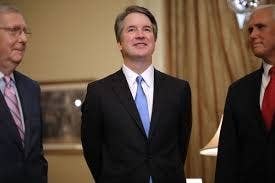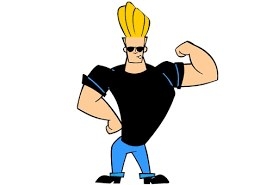Notes From A Former Boys Prep School Teacher: “It’s Not The Thing He Would Have Done” And Other Fallacies In The Defense Of Kavanaugh
by Natasha Singh, Sexual Literacy Educator www.sexlited.com
1. “It’s Not What He Would Have Done”

It's the refrain we’re hearing from supporters of Brett Kavanaugh. But it’s a refrain without any merit because people cannot correctly conjecture whether someone is capable of perpetrating sexual violence any more than they can correctly conjecture the content of someone else’s sexual fantasies or the particulars of their sexual behavior in the bedroom (or wherever it is that people have sex). If we were truly able to identify perpetrators (past, present, and future) based on what we know of their character, we wouldn’t be so shocked and dismayed by the countless reports of priests, producers, teachers, actors, politicians, coaches, school counselors, doctors, bosses, writers, and academics in our communities who have harassed or sexually assaulted others. So when people step forward to support an accused perpetrator on the basis of: “This accusation is not consistent with their character,” as Kavanaugh’s supporters and wife have recently done, their expressions of solidarity fly in the face of what victims of sexual assault already know: Even persons of integrity, as Kavanaugh has described himself, do not demonstrate their integrity across the board or over time.
2. But Kavanaugh Went to Church and Did Service Projects!

When men like Brett Kavanaugh find themselves under the glare of public scrutiny, they can change the conversation by not hiding behind adamant and predictable denials or repetitive and rehearsed sound bites. They can be willing to admit past behavior, or, in Kavanaugh’s specific case, the possibility of it. If we are to believe Mark Judge who writes about his peers as having been frequently drunk and having no memory of their behavior, isn’t it, at the very least, possible that Kavanaugh attempted to sexually assault or harass women but has no recollection of his actions? Isn’t it possible that Kavanaugh’s memory—and his accounting of what transpired that night or during his college days—could be seriously impaired?
But Kavanaugh has refused to entertain such a possibility (at least publicly) and instead is busily recasting himself as an innocent, virtuous, and studious teen. According to his Fox interview, Kavanaugh spent his high school years primarily studying, attending church, doing service projects, playing sports, and being a friend. Apparently, he didn’t drink much either. Kavanaugh’s insistence on creating this fictional past self, however, is problematic, for it contradicts not only his yearbook page and peers' accounts, but also the statement he made in public: “What happens at Georgetown Prep stays at Georgetown Prep. That’s been a good thing for all of us.” This phrase refers to the unique culture that can permeate all-boys schools where a strict adherence to boy code means that boys don’t tell on one another. In fact, they often protect each other at all cost—even when it might mean betraying themselves or possibly harming others. Evidently, Cavanaugh was still relying on this code—and banking on being protected by others—when he attempted to cast himself as a virtuous teen and young adult. Predictably, that plan backfired, as it sparked outrage on the part of others who knew him—and are finally speaking out.
3. “What Happens at Georgetown Prep Stays at Georgetown Prep.” Not Anymore!

Having once been a young female teacher at one of the most prestigious all-boys schools in the country, I think such environments can be their own special breeding ground for not only brilliant thinking and abiding friendships, but also toxic masculinity and unchecked misogyny. At the time of this writing, I’m reminded of many incidents that occurred when I was a young teacher, and two involve former students. Let’s call the first student Jed. This boy, always well dressed and exceedingly polite, had brown wavy hair and a house in the Hamptons and was beloved by all his teachers, including me. Assured of both his graduation and his place at a top Ivy League school, he submitted a final paper for my class in which he described himself masturbating to the thought of me on my knees giving him a blowjob. When I read these lines, I was shocked and pained and felt as though I’d been sucker punched. But I told no one because I felt isolated as the only female in my department and because I believed his disrespect was somehow a reflection on me—that I must have done something to earn it. When I handed his paper back to him, his expression was chillingly smug (I’ll never forget it)—like he’d gotten away with something. And he had.
Then there was the time when another student—I’ll call him Stewart—looked me up and down in front of a group of his peers and remarked, “Nice rack.”
We were in the school cafeteria, and I remember thinking that surely I hadn’t heard right. Nevertheless, I turned and asked him sharply, “What did you just say to me?”
Though he was suspended for this infraction, even more troubling to me was my walking in on a subsequent grade level meeting where his fellow classmates—all of whom were regularly called the future leaders of America—were discussing how unfair it was that Stewart had to face consequences. I overheard his peers expressing their concern over Stewart’s school record—and then their outrage over how such a “small” infraction could affect his chances of getting into the college of his choice. At no time did I hear any of these boys express concern or curiosity about what it might have felt like to be on the receiving end of such misogyny. Indeed, at the time, such consideration seemed quite beyond them. Though I felt shaken, I tried to use this experience as “a teachable moment” in my classroom. Whether these boys liked it or not, I still wielded some power as their teacher. I was not—as Christine Blasey Ford was when she had to consider all the options before her thirty years ago—a girl in hiding.
Still, for every boy I’ve taught who has perpetrated some sort of sexual harassment or violence, there have been countless others who haven’t. But these stand-up boys don’t always stand up or speak out, for the social costs may be too high. My hope—through the teaching I now do—is to cultivate in boys ethics, values, and resilience. My hope is that more of them will stand up for what’s ethical and right—even it might require breaking with the boy code that binds them. My hope is that boys—and grown men—will no longer have to resort to "What happened here stays here" because there will be nothing unethical to hide.
4. But What About Kavanaugh’s Career?!

This past year, as I’ve watched people—from radical feminists to die-hard republicans—rally around those accused of sexual harassment or sexual assault, I’ve marveled at the similarities between their expressed concerns, many of which seem to prioritize these questions: “Will he/she lose their job? When can they get back to work? What about their many contributions to the field?” The more insidious rallying cries on behalf of Kavanaugh, however, have sunk to a new low, for they propagate distorted messages about masculinity that suggest that a boy’s rite of passage into manhood includes perpetrating an assault similar to the one that Christine Blasey Ford described.
While concerns about a fair process surrounding accused perpetrators are real and such considerations are just, it’s important to remember that false accusations are relatively rare and until only very recently, victims of sexual assault who have come forward have been overwhelmingly shamed, blamed, or devastated into life sentences of silence. If we are going to make our society safer and better for all, then we must, at a minimum, ask different baseline questions that demonstrate genuine concern for those brave enough to come forward. What would our communities look like if we first asked, “How did a victim manage? How did they survive? What can we do and say to support them?”
Contrary to what some senators would have us believe, it’s equally important to remember that not all men have perpetrated sexual violence. Yet the men who might have a history of perpetrating sexual violence in its myriad forms continue to dominate the national conversation with their fears, denials, guilt, ignorance, indifference, or abject terror of being found out. So, in order to wade through all the voices chiming in on Kavanaugh, when I learned he was giving an interview on Fox, I was prepared to listen. However, throughout his interview, he appeared bewildered and vulnerable and so overtly committed to his script that he could only robotically repeat the same line several times at the end. Armed with soundbites, pivots, and denials, he only ended up shooting himself in the foot. Increasingly, he looked not like a man who had been wrongly accused but a man who—in spite of his best efforts to prove otherwise—knows he can no longer rely on impunity.
5. But Kavanaugh Was Just a Teen and Teens Do Stupid Things!

Should teens be held accountable for their behavior thirty years later? When Kavanaugh was asked a variation of this same question during the Fox interview, he responded with, “People should be judged by their whole lives.” Now that’s something for us to chew on, for this statement points to the argument he tried—and failed—to make: that he has been behaving with integrity his whole life. As many of us know, such a standard of excellence is nearly impossible for any of us to maintain, particularly when we look back at our younger selves. And while many of us have done things we regret doing as teens, we cannot change our pasts. But our present-day adult self has the power to assert a new and more nuanced narrative—one that permits itself to be held up to a new light and changing values. Our adult self can express remorse for past behavior instead of trying to cover it up. Our adult self can rise up and attempt to take responsibility now. When men like Brett Kavanaugh grow up and find themselves under the glare of public scrutiny, they can change the conversation by not hiding behind adamant denials or rehearsed soundbites. Instead, they can be honest, nuanced, humble, and real.
As a Sexual Literacy educator, I recognize that teens do and say regrettable things. For instance, in a recent co-ed class I taught on consent, a few of the boys in my class told me it was normal for boys to solicit and circulate sexually explicit images of their female classmates. When asked whether they believed this behavior was ethical, they seemed genuinely confounded, as though they’d never before considered such actions through the lens of ethics. One of them even said, “I never thought sexual stuff and ethics went together.”
So when I think about a young Kavanaugh—or of any of the boys I’ve taught or currently teach—I understand why the justice system differentiates between minors and adults. I understand why teens aren’t permitted to drive until age 16 or why they’re not allowed to rent cars until age 21. Their minds are still under construction; their prefrontal lobes aren’t fully developed. They’re often impulsive, thoughtless, and foolish. They can make poor decisions, and when alcohol is thrown into the mix, it’s likely that their decision-making skills become that much poorer. But does this all mean that the young Brett Kavanaugh—or other young people—have earned free passes to sexually harass or assault others? Absolutely not.
But it does mean that parents and educators need to do a far better job of teaching kids about consent, gender literacy, ethical decision-making, sexual harassment, healthy relationships, and the dangers of combining alcohol with sexual activity. It means that we need to help kids understand that “ethics and values” do apply to the sexual arena—and that we cannot afford to wait until teens are in high school to begin having these conversations. Based on the stories that are emerging in the wake of #MeToo, it would seem that the sexual arena is a place where our values are being—and need to be—asserted. And, many years after the fact, how we hold and talk about our sexual experiences may be the biggest test of our values yet.
Become a Community Contributor.

